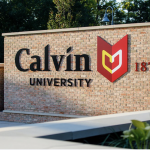Degrees Behind Bars: Higher Education for a Higher Purpose
Seminaries offer college-level theological training to prisoners

In the course of incarceration, some prisoners come to faith in Christ and wish to pursue a biblical education.

Photo via SEBTS 2024 Prison Program graduation page
Christian instruction that results in moral rehabilitation can have a positive impact, reducing “negative emotions and deviant behaviors among prisoners,” according to an article by two Baylor University professors.
Several Christian seminaries and educational institutions have understood that the prison population is a mission field they can reach. They offer various certificates and degrees for incarcerated persons.
In Florida, Miami International Seminary, also known as MINTS Seminary, started its in-prison program in 2010 after an inmate requested theological training from a doctrinally Evangelical and Reformed perspective. That’s when Cornelius Hegeman, PhD, made his first visit to Zephyrhills Correctional Institution.
Now, MINTS has over 450 active students who have taken at least one course in the last 12 months and 192 graduates from its educational and degree programs, Hegeman told MinistryWatch.
It has developed study centers in 22 prisons in the United States, 20 of which are in Florida. Hegeman said that students study by correspondence course in about 10 other prisons. After their release, MINTS-trained prisoners can seek employment with Christian ministries and churches.
But the primary goal of MINTS is the personal and spiritual growth of incarcerated students, who “will grow and mature as individuals and progress in reforming their character and behavior,” according to the program’s website.
Access to MinistryWatch content is free. However, we hope you will support our work with your prayers and financial gifts. To make a donation, click here.
Inmate graduates also become teachers and professors to others within the prison system. In fact, Hegeman said some of the prison study centers are completely run by inmates, with volunteers advising.
“The recidivism rate of our graduates who have left prison currently is less than 1%, while the average rate in Florida is above 25%,” Hegeman said.
“Of our 194 graduates who remain in prison, their conduct has been exemplary.”
MINTS offers degree programs ranging from a certificate to a PhD in Theological Studies, with all ranges in between.
Tuition is free for imprisoned students, Hegeman said. In fact, after they are released, MINTS students can study without tuition costs until they finish their next degree.
According to Hegeman, the 10-person staff of MINTS raise their own support.
“Financing is a challenge, and we put that responsibility on the teacher and not the student. The Lord has provided,” he said.
MINTS is a member of the Evangelical Council for Financial Accountability (ECFA) and files a Form 990 with the Internal Revenue Service.
MINTS acknowledges that its model is not novel. In fact, the Louisiana State Penitentiary at Angola has been using a similar model.
New Orleans Baptist Theological Seminary (NOBTS) offers classes at Angola taught by seminary faculty and adjunct teachers in the area. Students can earn an associate’s, bachelor’s, or master’s degrees.
NOBTS offers study programs at five prisons, including one in Mississippi and one in Florida.
An initiative between Calvin University and Calvin Theological Seminary offers “a Christian liberal arts education to inmates at the Richard A. Handlon Correctional Facility in Ionia, MI.”
Each year 20 students enroll in a five-year program to earn a bachelor’s degree in faith and community leadership. Currently, 93 students are enrolled and 62 degrees have been granted.
On Tuesday, May 14, the College at Southeastern, the undergraduate institution of Southeastern Baptist Theological Seminary, honored 17 graduates of its North Carolina Field Minister Program.
According to its website, field ministers serve other prisoners in many ways, such as in hospice care, grief counseling, mentoring, hospital visits, along with teaching and discipleship.
Secretary of North Carolina Department of Adult Correction Todd Ishee told the graduates he was proud of them and their work.
“Today our future is brighter because of each of you guys. We cannot wait to see the incredible work that you’re going to do,” he said.
The Heart of Texas Foundation also has a field ministers program and has been graduating prisoners from its program since 2015. In 2021, its programs were accredited to operate at colleges within the state.
It currently has a bachelor’s in Applied Ministry program for men at the Memorial Unit in Rosharon, Texas. Incarcerated women from around the state can apply to be transferred into a class of 40 in the women’s program at the Hobby Unit in Marlin.
The Heart of Texas Foundation College of Ministry’s mission is to take “the gospel of Jesus Christ into the darkest of places in the Texas prison system through our bachelor degree program which educates men and women with long-term prison sentences.”
Guidestar gives the program a platinum rating and it files Form 990s with the Internal Revenue Service, but it is not a member of the ECFA.
TO OUR READERS: Do you have a story idea, or do you want to give us feedback about this or any other story? Please email us: [email protected]








